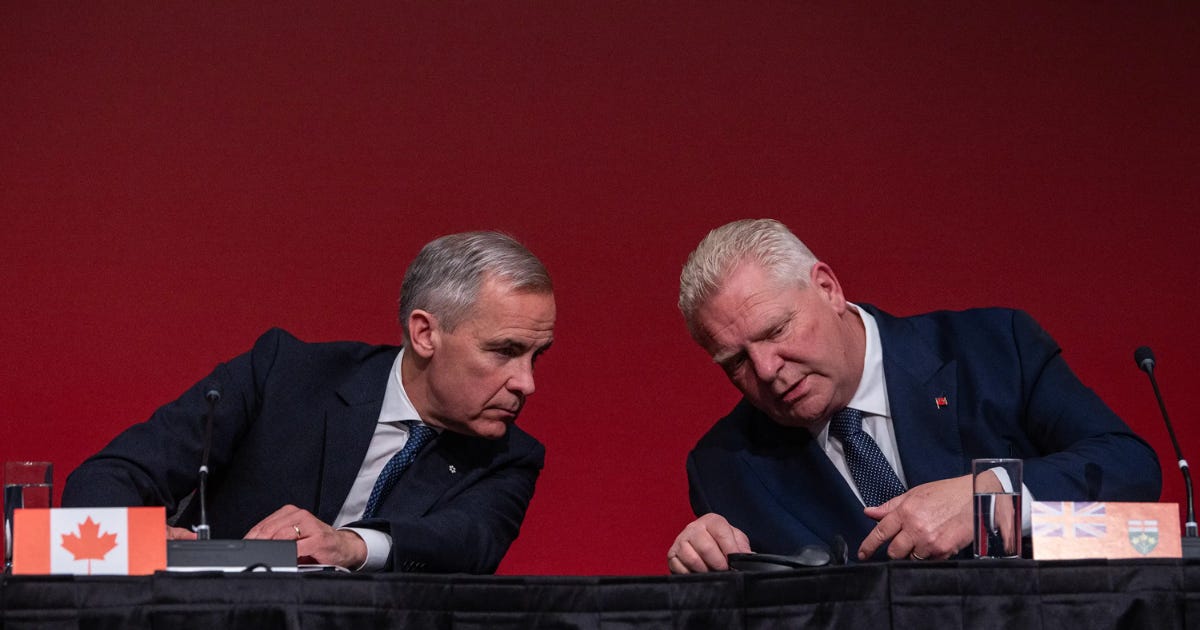Doug Ford throws '100% support' behind Carney and the Liberals
Ontario Premier Doug Ford said he was “100 per cent supportive” of Prime Minister Mark Carney and his Liberal government.
While dodging a question on whether he’d ask the federal government to increase counter-tariffs to match Trump’s 50 per cent tariffs on aluminum and steel, Ontario Premier Doug Ford said he was “100 per cent supportive” of Prime Minister Mark Carney and his Liberal government.
During a press conference on new infrastructure investments, Ford told reporters that talks with U.S. counterparts over recent tariff increases from U.S. President Donald Trump were going positively and that he fully backs Carney.
“Let me be very clear. I’m 100 per cent supportive of the prime minister and the federal government, and when you sit around and family dinner table, you discuss all sorts of ideas, and that’s what we’re going to do,” Ford told reporters.
Canada failed to strike a trade deal with the U.S. by Trump’s August 1st deadline. Many international counterparts, including the E.U., struck deals with better rates than Canada, which was left with the fifth-highest tariff rate worldwide.
After Carney failed to strike a deal with Trump, the U.S. hit Canada with a 35 per cent tariff on select Canadian goods. Carney has yet to announce whether he will hike counter-tariffs in response.
Ford said the counter-tariffs have already been successful against the U.S., costing its auto industry $6.2 billion in tariff-related expenses, with “most” projecting higher costs for the year.
“We’re looking at 37,000 manufacturing jobs that have disappeared in the U.S., and factory employment is the lowest it has been in five years, which is not a good thing,” he said. “President Trump has to realize it’s costing companies billions of dollars. Procter & Gamble, it cost them a billion dollars. You look at Mattel, you look at all the Ford Motor Company and all the auto companies.”
Ford said he warned American audiences before the tariffs were in place that tariffing Canada would spell disaster for several U.S. industries.
“He’d rather fight. I don’t want to fight. I don’t want to fight with our closest allies and friends. And to be very frank, neither do the governors, the senators, the Congress people,” he said. “They don’t want to fight with their closest ally.”
Ford said conversations with the U.S. are going well and were “positive,” citing that U.S. Secretary of Commerce Howard Lutnik said that “he really likes Canadians,” but admitted that the premier and Lutnik “differ on tariffs.”
While discussing the call with Lutnik, Ford said that Canada and China were the only two countries that have tariffs against the U.S., but that he would rather Canada and the U.S. return to a freer trade deal and allyship.
“It’s very clear, there are two countries in the world that have tariffs on the United States. One is China, that want to economically and militarily, eventually annihilate the U.S. — economically, not militarily, but economically,” Ford said. “Canada has been a member of the family for 200 years, and has fought shoulder to shoulder with the United States. Their number one trading partner in the entire world, bar none, is Canada.”
He noted that Canada buys $359 billion a year of products from the U.S., a rate higher than Japan, China, Korea, the U.K., and France combined.
“So you have to respect your largest customer. The U.S. is our largest customer. We respect them, but it has to go both ways,” Ford said. “You can’t have tariffs on one side and not the other. I still stand by what I say, dollar for dollar, tariff for tariff. They understand strength, not weakness, and we should never, ever roll over and be weak.”





